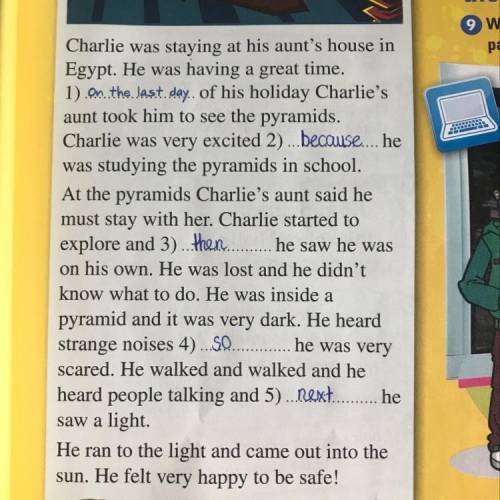
English, 17.10.2021 04:50 caitlinhardin8553
EXERCISE 6:Put (A-E) in the order they appear in Charlie’s story to make a plan.
A. What happened?
B. Where did the story happen? Ex:(1)
C. How did he feel after the event?
D. What were they doing?
E. What was the result?
Do the Exercise here:
EXERCISE 7:Write the answers to the questions in Exercise 6.
Ex: 1)Where did the story happen?
The story happened in Egypt


Answers: 2
Another question on English

English, 21.06.2019 20:10
Clearly show? ramona: anna, where does the theme seem to change? anna: according the article: "the fault lies with the fda's inability to release enough information in order to regain the public's trust. but perhaps japan is to blame as well. although there are plans to remove the spent nuclear fuel rods and build a permafrost wall around the four damaged reactors, is this really enough to recover damaged trust? " and then sato goes on to explain this statement. o a. challenging established ideas o b. using evidence to support your conclusions o c. asking clarifying questions o d. synthesizing claims into a single conclusion
Answers: 3

English, 22.06.2019 01:30
Create a well-crafted essay of 1-2 pages outlining a likely theory of king tutankhamun’s death at the age of nineteen. your goal is to convince peers your age that this is the most reasonable theory according to the evidence. incorporate the subjunctive and conditional moods within your writing. use the following rubric to guide your writing. remember to check your spelling (by using a spell checker and also against the original text) to ensure the proper spelling of names and places in king tut’s world. reminder: spell checkers are great, but they’re not always right. think about terms specific to egypt or even tutankhamun’s name. a spell checker won’t know if you’re spelling these correctly, so check with the reading to keep consistent. rubric criterion exceptional capable developing beginning points earned ideas & content main claim supporting details sources are cited clear, focused, interesting ideas with appropriate detail, sources are cited evident main idea with some support which may be general or limited, sources are mentioned main idea may be unclear; supporting detail is vague or off topic, some source information used central idea or theme is not stated; supporting detail may be nonexistent, no sources mentioned organization structure (claim/counterclaim) introduction conclusion strong organization; seamless paragraph transitions; effective and engaging intro and conclusion organization is appropriate but conventional; attempt at introduction and conclusion attempts at organization, inappropriate use of lists or bullets; introduction and conclusion are not developed no introduction or conclusion; no clear organizational framework or transitions voice personality sense of audience appropriate to audience; expressive, engaging, sincere voice is appropriate to topic, but inconsistent or dry voice may be inappropriate; writing may seem mechanical writer’s voice is inappropriate or nonexistent word choice precision effectiveness imagery broad range of descriptive words; creative examples, vivid details and images language is functional and appropriate; descriptions may lack detail or be overdone words may be correct but simplistic; no attempt at detail, description, or examples word choice is limited, words are often misused; supporting detail and examples are nonexistent sentence fluency rhythm, flow variety easy flow and rhythm; good variety in length and structure sentences are appropriate but lack variety and length awkward phrasing and structure, similar patterns and choppy language sentences are incomplete or difficult to follow, language is confusing conventions age appropriate spelling, capitalization, punctuation, grammar strong use of correct conventions; errors are few and minor most writing conventions correct; occasional high profile errors frequent errors; most do not interfere with readability frequent errors interfere with readability
Answers: 1


English, 22.06.2019 06:00
The attitude the speaker in this poem holds toward himself can best be described as
Answers: 1
You know the right answer?
EXERCISE 6:Put (A-E) in the order they appear in Charlie’s story to make a plan.
A. What happened?...
Questions




Chemistry, 04.04.2020 02:21






Arts, 04.04.2020 02:21





English, 04.04.2020 02:22

Mathematics, 04.04.2020 02:22






